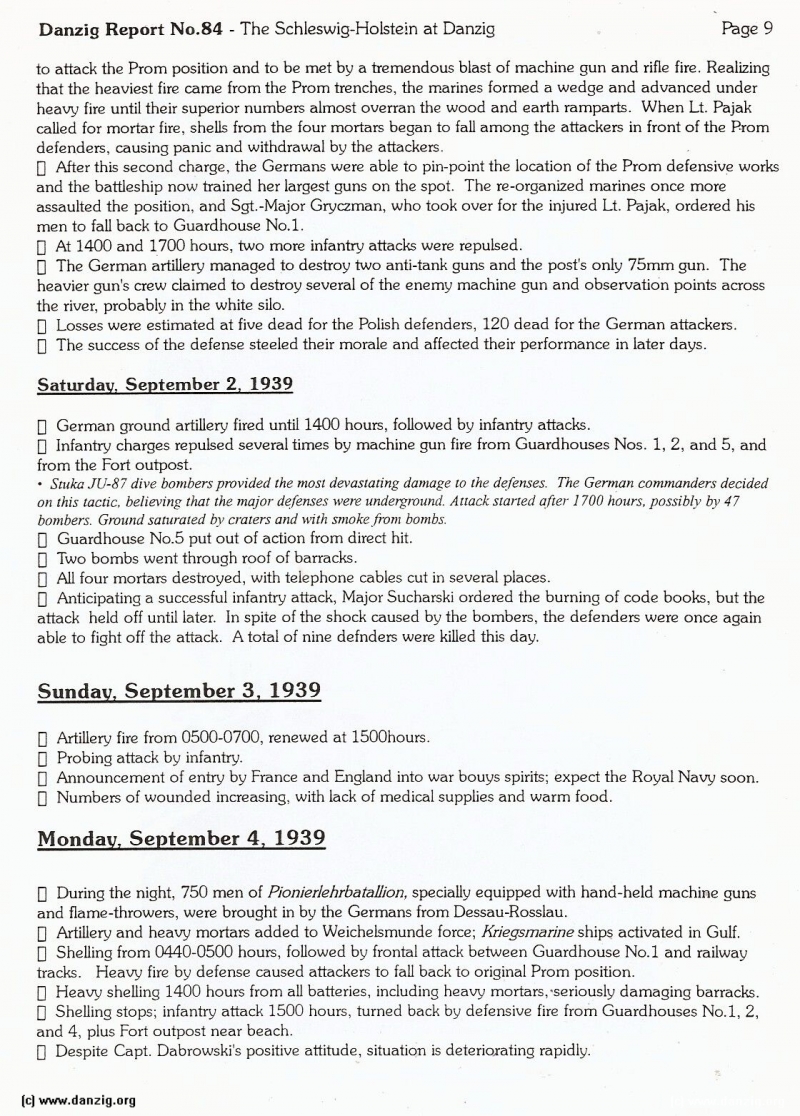
to attack the Prom position and to be met by a tremendous blast of machine gun and rifle fire. Realizing that the heaviest fire came from the Prom trenches, the marines formed a wedge and advanced under heavy fire until their superior numbers almost overran the wood and earth ramparts. When U. Pajak called for mortar fire, shells from the four mortars began to fall among the attackers in front of the Prom defenders, causing panic and withdrawal by the attackers.
After this second charge, the Germans were able to pin-point the location of the Prom defensive works and the battleship now trained her largest guns on the spot. The re-organized marines once more assaulted the position, and Sgt.-Major Gryczman, who took over for the injured Lt. Pajak, ordered his men to fall back to Guardhouse No.1.
At 1400 and 1700 hours, two more infantry attacks were repulsed.
The German artillery managed to destroy two anti-tank guns and the post’s only 75mm gun. The heavier gun’s crew claimed to destroy several of the enemy machine gun and observation points across the river, probably in the white silo.
Losses were estimated at five dead for the Polish defenders, 120 dead for the German attackers.
The success of the defense steeled their morale and affected their performance in later days.
Saturday, September 2, 1939
German ground artillery fired until 1400 hours, followed by infantry attacks.
Infantry charges repulsed several times by machine gun fire from Guardhouses Nos. 1, 2, and 5, and from the Fort outpost.
&uka JU-8 7 dive bombers provided the most devastating damage to the defenses. The German commanders decided on this tactic, believing that the major defenses were under’round. .4 tiack starred after 1700 hours, possibly by 47 bombers. Ground saturated by craters and with smoke from bombs.
Guardhouse No.5 put out of action from direct hit.
Two bombs went through roof of barracks.
All four mortars destroyed, with telephone cables cut in several places.
Anticipating a successful infantry attack, Major Sucharski ordered the burning of code books, but the attack held off until later. In spite of the shock caused by the bombers, the defenders were once again able to fight off the attack. A total of nine defnders were killed this day.
Sunday, September 3, 1939
Artillery fire from 0500-0700, renewed at l500hours.
Probing attack by infantry.
Announcement of entry by France and England into war bouys spirits; expect the Royal Navy soon.
Numbers of wounded increasing, with lack of medical supplies and warm food.
Monday, September 4, 1939
During the night, 750 men of Pionierlehrbataliion, specially equipped with hand-held machine guns and flame-throwers, were brought in by the Germans from Dessau-Rosslau.
Artillery and heavy mortars added to Weichelsmunde force; Kriegsmarine ships activated in Gulf.
Shelling from 0440-0500 hours, followed by frontal attack between Guardhouse No.1 and railway
tracks. Heavy fire by defense caused attackers to fall back to original Prom position.
Heavy shelling 1400 hours from all batteries, including heavy mortars,seriously damaging barracks.
Shelling stops; infantry attack 1.500 hours, turned back by defensive fire from Guardhouses No.1, 2,
and 4, plus Fort outpost near beach.
Despite Capt. Dabrowski’s positive attitude, situation is deterioxating rapidly.
Danzig Report Vol. 1 - Nr. 84 - July - August - Sept - 1994, Page 9.
Hits: 3516
Added: 09/07/2015
Copyright: 2025 Danzig.org

